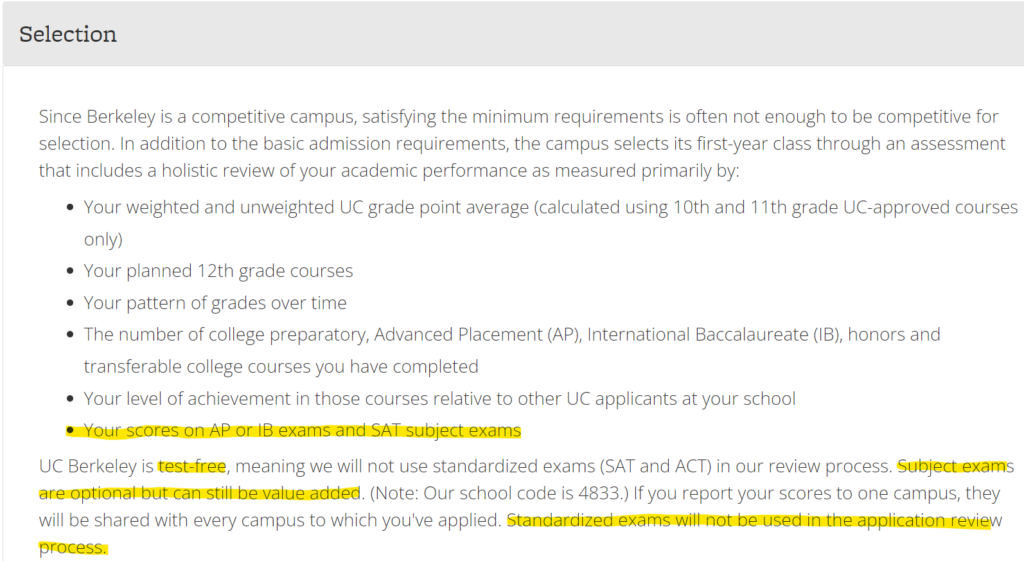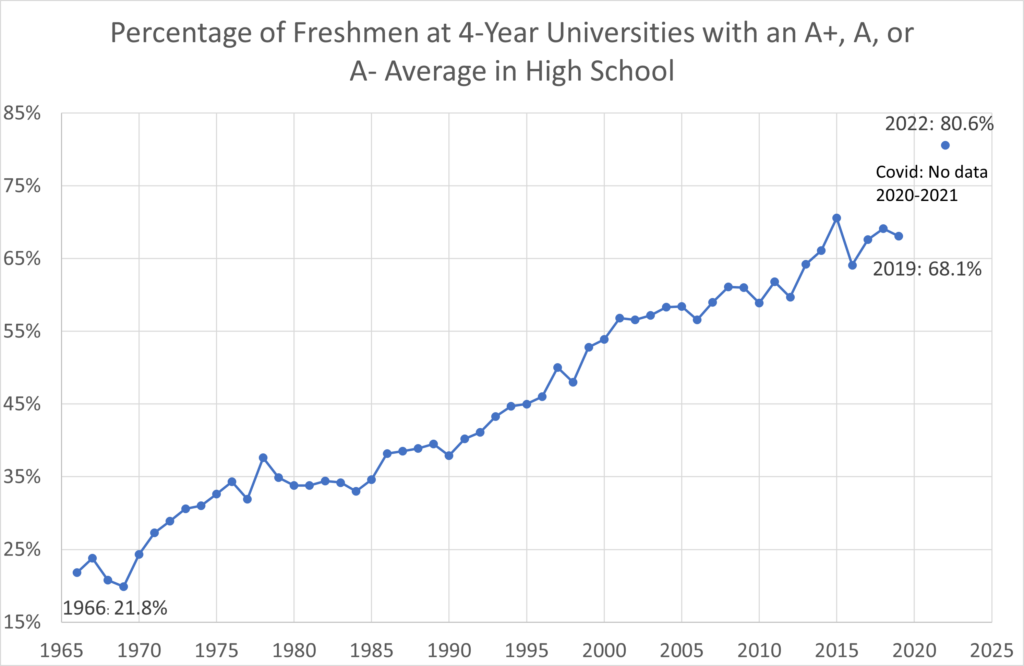While the headline news on college admissions testing is that Dartmouth and Yale have returned to requiring test scores for admissions consideration, the implications of the redefinition of “test-required” has not yet been fully grasped. The implications of this redefinition are significant.
Previously, “test-required” meant that a college required an SAT or ACT score for admissions consideration. Now, Yale has (accurately) redefined the term to mean that an SAT, ACT, AP, or IB exam score is required. That’s a massive shift, and we’ll dive into why.
Testing Policies Redefined/Clarified
As previously discussed, there were multiple categories of college admissions testing policies: test-required, test-optional (and many flavors of this type), and test-blind.
But “test-blind” has always been an inaccurately named category because it really just means “SAT/ACT-blind.” Even “test-blind” schools, like Caltech and UC Berkeley, very much consider other standardized test scores (such as AP exam scores) in their admissions decisions.
UC Berkeley
Here is a snapshot from UC Berkeley’s admissions webpage (also look at how confusing it is):

Berkeley says its assessment of academic performance includes scores on AP or IB exams. Then it says it’s test-free. Then it says subject exams are optional but can still be value added. Then says standardized exams will not be used in the application review process.
And, in its most recent Common Data Set, it says it does consider standardized test scores in admissions decisions.

To clarify: UC Berkeley DOES use AP and IB exam scores to help make admissions decisions.
Caltech
Caltech too calls itself “test-free.”
It is not test-free or test-blind.
This is from Caltech’s admissions website:

Yes, Caltech is totally test-free, except if a student hasn’t taken four years of Mathematics, one year of Physics, and one year of Chemistry. Then it is literally test-required. No exceptions.
Testing Policies Correctly Defined
There has never been a selective test-blind college. So far, there have only ever been test-optional colleges that are actually only SAT/ACT-blind but call themselves “test-blind” (but then why do those colleges use even less accessible standardized exams, like AP exams, in their admissions decisions? — given rampant grade inflation in high school GPA, a cynical take is that they want/need standardized test scores, but saying they are “test-blind” is great for boosting their number of applicants so that they can reject more applicants and drive their admit rate down). And, functionally, the few elite “test-blind” colleges are not even “test-optional.” To get into UC Berkeley and Caltech, students essentially had to send AP exam scores if AP courses were offered at their schools — and those AP exam scores had better be 5s (the highest possible score on the exams).
Hopefully Yale correctly defining “test-required” will convince colleges that falsely claim that they are “test-blind” to clarify that they are “test-optional” or even “test-expected” — where the expectation is that applicants will send numerous perfect AP or IB exam scores even if the school is SAT/ACT-blind.
Alternate Standardized Test Scores for Admission
Yale describes the college selection process well: “An application is like a jigsaw puzzle: the picture is not complete without all its pieces.”

In 1966, only about 20% of students going onto 4-year universities that grant bachelor degrees had A-averages in high school. In 2022, that figure was completely flipped: only about 20% of these students did not have an A-average in high school — 80% did.
In an era of rampant grade inflation, the jigsaw puzzle of a college application to a selective or highly selective college — even one that claims it is test-optional — is incomplete without a standardized test score.
Emory’s dean of admission, John Latting, has been the most explicit: “We’re not as trusting, frankly, of GPA these days. Students are trying their hardest… but grades are definitely inflated and not as connected to true class performance as they used to be. [Emory’s admissions office is] weighing ‘external assessment’ more heavily than GPA, with a particular focus on AP scores.”
Thus, Yale’s decision to use AP and IB exam scores as alternative scores to SAT/ACT scores for admissions decisions is an expression of the new norm, not an aberration from it.
And, even for test-optional colleges, the difference between SAT/ACT-optional and test-optional might seem small, but it’s significant. More and more, colleges are looking for AP and IB exam scores to make admissions decisions — which also means that if a student has taken an AP or IB class, then selective colleges are increasingly expecting students to submit the scores from those exams.
Updated Categories of Testing Policies
Just like the testing policies of colleges are in flux, so too are the categories that define these policies.
Now, the categories of college testing policies are best defined as follows:
- Functionally Test-Required: a test score of some kind (SAT, ACT, AP, IB) is explicitly or essentially implicitly required to get accepted
- SAT/ACT-required: an SAT or ACT score is required to apply (MIT, Dartmouth, Georgetown, Georgia Tech, etc).
- Test-required: a standardized test score whether from an SAT, ACT, AP, or IB exam is required to apply (Yale — but expect this category to grow substantially).
- Test-required with rare exceptions: most elite colleges are essentially test-required except for rare exceptions, such as recruited athletes; for instance, 93% of students at Duke (likely except recruited athletes and a few others) submitted SAT/ACT scores for admissions consideration.
- Test-Optional: a test score of some kind (SAT, ACT, AP, IB) ranges from very helpful to get accepted to truly not needed to get accepted (though test scores can still help increase the chances of more merit aid/scholarships).
- SAT/ACT-Preferred: a school explicitly states that they recommend students submit an SAT/ACT score for admissions consideration (Ohio State, Auburn, etc) or implicitly does so if more than 50% of its enrolled students submitted test scores (check section C9 of a college’s Common Data Set, which you can do a Google search for, to determine this for a given college).
- Test-Preferred: this includes the elite SAT/ACT-blind colleges, like Caltech and UC Berkeley, that still want to see some standardized test scores.
- Truly Test-Optional: these are most colleges because most colleges accept most applicants; at these colleges, students with good grades and/or who are full-pay (because the priority for all of these colleges is keeping the lights on) have legitimately high chances of admission without submitting any test scores, whether SAT/ACT scores or others.
Test-Blind: not a real thing
Most colleges care about their budgets first and the quality of their students second (they need to do so; if they under-enroll, then they literally face nearly immediate budget cuts).
For those colleges that prioritize the quality of their students and their students’ educations, they want to see test scores — but that increasingly includes any test scores, including AP and IB exam scores.







